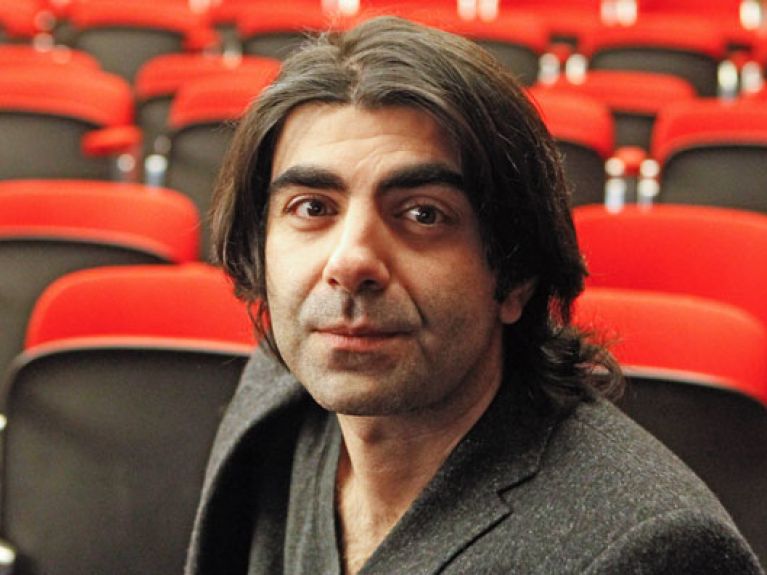The surprising success of the imperfect
A book, a play and now also a film – Tschick has already become a classic. The author was probably more surprised than anyone by its huge success.

Fatih Akin was bowled over when he read Wolfgang Herrndorf’s young adult novel Tschick (Why We Took the Car) shortly after its publication in 2010. Everything about the story impressed the German director, and he soon sought to obtain the film rights. With the necessary artistic freedom – something the author always endorsed completely – Akin turned the original novel into a fast-paced road movie. A highly atmospheric film, Tschick portrays two youngsters who discover more about life in just a few days than they had learned previously during an entire school year. As a result, this is by no means only a film for young people.
German literature has a sad fact to thank for the minor miracle that is Tschick. When Wolfgang Herrndorf looked through his unfinished projects in the spring of 2010, trying to decide which could be brought to publication in the shortest possible time, a tumour had been discovered in his head a short time earlier. No doctor could tell him how long he had to live. He chose to revise the 150 pages of a work of young adult fiction he had scribbled down in a matter of days six years previously.
Tschick’s real name is Andrej Tschichatschow. An ethnic German from Russia, he is the new boy in the class of Maik Klingenberg, the novel’s 14-year-old first-person narrator. Tschick comes from a deprived family background, whereas Maik – a bit of a misfit – has parents with money, yet his father takes his mistress on vacation while his alcoholic mother goes into rehab. When the summer break begins, Tschick steals an old Russian Lada. The two set off in the car to drive south from Berlin. They end up in the bizarre landscape of Germany’s lignite mines, meet some surprisingly friendly people, cause accidents and are constantly on the run from the police. Nothing is really surprising about this novel, yet everything is amazingly fresh and told as if it were just happening for the first time in the history of the world.
Herrndorf felt ambivalent about his story of Maik and Tschick. “I do not know whether the chapters I have been laboriously cobbling together in recent weeks are any good,” he wrote in his diary blog “Arbeit und Struktur” (Work and Structure). He described the novel as comprising largely “stylistically dubious schoolboy prose with run-of-the mill ideas, and lacking in structure as a whole.” However, it may well be that the precise fact of Herrndorf wanting the book published as quickly as possible contributed to its success, as this left him virtually no time to rethink or revise it. To his horror, the author even found mistakes in the final print version. Yet it is precisely this non-perfection – the kinks that have not been ironed out and its various oddities – which, among other things, give the novel its charm. To the
author’s amazement, the book received almost only positive reviews following its publication in early October 2010. Writing in the Frankfurter Allgemeine Zeitung, Felicitas von Lovenberg predicted: “This will still be a novel we want to read in 50 years’ time.”
Tschick has indeed become a classic within a very short space of time. Its success is partly due to the fact that the novel taps into a reservoir of mental images and emotions that we all have. It is a pretty rare phenomenon for a critics’ favourite to become a favourite with the general public, but Tschick did not have to wait long for commercial success. Herrndorf’s novel has been heaped with numerous awards and has meanwhile been published in 26 countries. When the author gave up his fight against the tumour in 2013 and chose to take his own life, more than a million copies had already been sold. The success of the stage version is almost more surprising: in the adaptation written by the dramaturg Robert Koall, Tschick was the most-staged play in the 2012/2013 season, with 764 performances and 29 productions. And in subsequent years this road movie play beat Goethe, Schiller and Shakespeare, attracting impressive numbers of theatre-goers.
The recently published illustrated version by Laura Olschok will presumably not be the final attempt to recreate Herrndorf’s characters in pictures. Fatih Akin’s film adaptation will also further increase the book’s popularity. A pair of disparate friends, Maik and Tschick keep our memories alive of a wonderful author who might perhaps never have completed the book were it not for his illness. ▪

